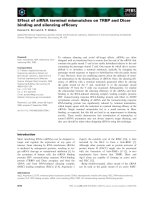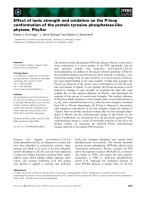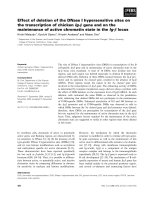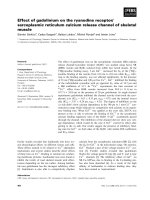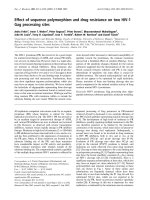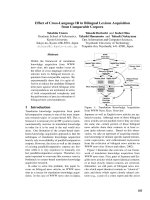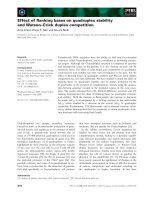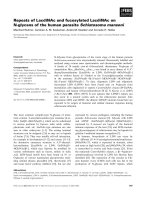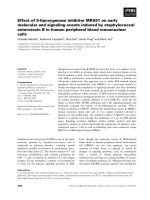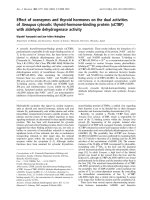Báo cáo khoa học: "Effect of Industrial Infrastructure, Nature of Disease and Animal Demographics on Surveillance Strategies in Poultry" ppt
Bạn đang xem bản rút gọn của tài liệu. Xem và tải ngay bản đầy đủ của tài liệu tại đây (30.54 KB, 1 trang )
Acta vet. scand. 2001, Suppl. 94, 29-29.
Acta vet. scand. Suppl. 94 - 2001
Effect of Industrial Infrastructure, Nature of Disease
and Animal Demographics on Surveillance Strategies
in Poultry
By Mogens Madsen
1
, B. Heier
2
, D. Jansson
3
, J. Reiersen
4
, P. Vennerström
5
1
Danish Veterinary Laboratory, 2 Hangøvej, DK-8200 Århus N., Denmark,
2
Veterinærinstituttet, Boks 8156
dep., NO-0033 Oslo, Norway,
3
National Veterinary Institute, P.O. Box 7073, SE-75007 Uppsala, Sweden,
4
Tilraunastod Haskola Islands, Keldum v/ Vesturlandsveg, IL-110 Reykjavik, Iceland,
5
EELA, P.O. Box 368,
FIN-00231 Helsinki, Finland.
The surveillance and control of poultry dis-
eases in the Nordic countries present a long and
to a large degree successful story which places
the Nordic countries in a position as being
largely free of most of the serious poultry dis-
eases that constitutes a menace and an obstacle
to effective and economically viable poultry
production world-wide.
The surveillance and control of zoonotic agents
in poultry equally place the Nordic countries in
a category of its own. The achievements ob-
tained within this area have provided the indus-
try with an advantageous position on the do-
mestic and export markets, in particular in
relation to the EU where Finland and Sweden
have been able to maintain special status and
guarantees for imported poultry products.
The control strategy adopted for both statutory
poultry diseases and zoonotic pathogens in
Nordic poultry production has from the very
beginning been based on surveillance and
stamping-out of infected flocks while vaccina-
tion strategies never have been adopted to a sig-
nificant effect.
In terms of biosecurity, the geographical loca-
tion of Nordic poultry production with a cli-
mate necessitating indoor production in closed
units probably has provided the Nordic coun-
tries with an advantage compared to production
in warmer climates with open-house produc-
tion facilities.
In the paper, the disease situation with refer-
ence to statutory poultry diseases and zoonotic
agents in each of the Nordic countries is re-
viewed, the organisation of control programmes
described, and sampling and testing procedures
presented and discussed.
